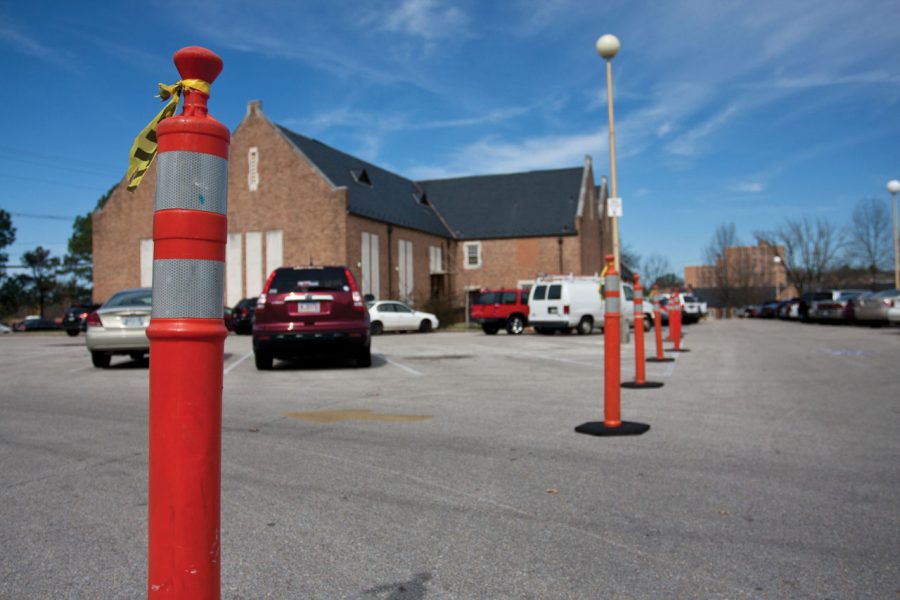Student-formed club stands against blocked parking lot on UNA campus
March 15, 2012
Frustrated with blocked parking spaces in the lot near the communications building, David McCreary and Jimmie Holden joined together with other UNA students to take a stand against the issue by forming an alliance called the Ribbon Cutters Club.
The group, which began establishing a reputation for itself in late February, made a splash in the UNA community when students started using social media as a form of protest against parking lots being blocked off on a campus with already limited parking availability.
The Ribbon Cutters Club movement has since gained a significant following and increased in participation at the university, Holden said.
“A lot of people don’t want to speak up,” he said. “But even if we are totally wrong or don’t have a lot of information, just being able to speak up sparks something in trying to find a compromise.”
McCreary said many students have taken the initiative to drive through the yellow caution tape when officials have reserved parking spaces on campus for what can sometimes be hours during high-traffic periods of the day.
UNA student Elizabeth Bell, who takes classes in the communications building, said she has to commute from Madison to campus five days a week and the blocked parking lots affect her ability to make it to class on time.
“It’s just hard for me because some of my professors have a strict policy that if you are even five minutes late for class, you get counted absent or you get docked points on your grade,” she said. “And when that lot is blocked off, all the parking around the communication building is taken and for me, it’s hard because I have to drive so far and usually have to leave 30 minutes early just to make it through morning traffic and I need to be able to find a parking space when I get to school and on those days, I can’t.”
Assistant professor of public relations Dr. Beth Garfrerick said it’s discouraging for her to see students struggle to make it to class on time as a result of part of the parking lot being blocked off for other events.
“From a professor’s standpoint, this harms the students, especially those with professors who have tardiness policies,” she said. “I’m mad on behalf of the students who are being late for classes.”
UNA police Chief Bob Pastula’s department works in conjunction with University Events to block off parking in that lot for both on and off-campus groups that reserve space in the GUC for events.
The parking lot by the communications building is sometimes blocked off for meetings that last up to an hour and other times for events that won’t occur until late afternoon or early evening.
Pastula said if police don’t block those parking spaces early enough in the day, people will park there all day and leave no open spots for visitors.
Bret Jennings, director of University Events, said he and his staff worked with the former police chief in the early 2000s prior to Pastula’s arrival to establish guidelines for reserving events at UNA. Currently, there are approximately 46 parking spaces in that lot that can be reserved for on or off-campus groups that rent facilities on campus.
Jennings said a better parking lot monitoring system would help to relieve some of the problems.
“Our original plan was to find the least amount of spaces that can be used with the highest amount of effectiveness to us with the least burden to the students,” Jennings said.
Many off-campus groups won’t come to campus for events if they can’t have a reserved number of parking spaces or are forced to use the shuttle bus, Pastula said.
Although officials try to encourage groups to use the shuttle service instead of blocking off spaces, Pastula said UNA must accommodate guests on campus, build a cohesive bond and maintain positive relationships between the university and community.
“It’s got to be a cooperative effort between the students and everybody else,” Pastula said.
Pastula said his department has toyed with the idea of sending out a mass email to the UNA community periodically to inform them when the parking lot will be blocked off due to an event, but he’s concerned that it might be ineffective because students, faculty and staff complain they already receive too many emails.
While officials work to find solutions for the issue, Pastula encourages students to use the shuttle bus system from the Darby Drive parking lot on Florence Boulevard or the downtown parking garage if they are concerned about not finding a parking space on campus.
“It just makes sense to me,” he said. “Why hunt for a space here when you can go park out there and not have to worry about it?”
Jayne Jackson, event coordinator for University Events, said most events that happen on campus, which require reserved parking spaces, are there to serve the students in some way and provide opportunities for them.
Jason Flynn, assistant professor of film and digital media, said it’s not going to be easy to find a solution to the parking issue because he understands the university’s perspective in wanting to accommodate other people and groups who host events on campus.
However, he supports the Ribbon Cutters Club in trying to raise awareness of and find a solution to the problem.
“I always support people who are trying to stand up and make a difference,” he said. “Parking spots are not as enriching to society as other causes, but I think that anytime people identify a problem, organize, stand up and be verbal, it is a positive thing.”
Pastula and Jennings both encourage students to contact them directly about concerns they might have about the parking lots or to offer solutions to the problem.


